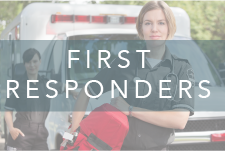Alcoholism in Law Enforcement
- Nov 12, 2020
- 10 min read
Updated: Sep 4, 2025

Law enforcement officers face unique and immense daily stressors, and it's no secret that these pressures can lead to mental health challenges like depression and PTSD. You might be wondering how common these issues are and, more specifically, how they connect to substance abuse like alcoholism. We have the data and insights to help you understand this critical issue and what can be done about it.
What percentage of first responders are struggling with substance abuse?
According to the American Addiction Centers, surveys suggest that up to 30% of individuals in first responder professions may be struggling with substance abuse. This highlights the widespread nature of the problem among those who serve our communities.
This issue is far more common than many people realize, and understanding the specific reasons behind it is the first step toward finding solutions. Let's delve into the unique stresses law enforcement officers face, the dangerous cycle of alcohol use, and how we can start a conversation that leads to real change.
What are the main reasons law enforcement officers may turn to alcohol for self-medication?
Law enforcement officers are under an immense amount of stress on a daily basis. Due to the dangerous nature of their work, stress and PTSD can be common occurrences among police. With constant stresses, public scrutiny, and a stigma that surrounds reaching out for mental health support, many officers may attempt to self-medicate their stresses to give their brains a break from this persistent sense of danger, with alcohol being a common avenue for self-medication.
Left unchecked, these coping strategies can create even more stress, as well as the risk of addiction, ultimately adding more danger to the already fragile nature of their work. Talking about the common presence of alcoholism in law enforcement officers and how it relates to depression in law enforcement or PTSD in law enforcement statistics is just the first step towards helping officers receive help for themselves while they continue to support, serve, and protect their communities.
Substance Abuse in Law Enforcement Is More Common Than It Feels

Suffering from an addiction to alcohol or drugs is an incredibly isolating experience. It is common for those who suffer from these diseases to wall themselves off, even from family and loved ones, and try to cope with the issue on their own. Whether through shame or a belief that nobody can understand the daily struggles that someone goes through, isolation can quickly set in.
However, substance abuse is more common among law enforcement officers than it may feel, with “surveys [suggesting] that as many as 30 percent of those in first responder professions may be struggling with substance abuse,” according to the American Addiction Centers.
Police alcoholism is an issue that needs to be addressed for the health of our officers as well as the betterment of the community they serve. Whether it is drugs or alcohol, many officers may turn to substances to help them ease their mental state or cope with their stresses or PTSD. However, even if the problem is more widespread than many would let on, learning what each person can do about it is still a monumental task.
Acknowledging that our law enforcement officers need support means understanding exactly how much stress they are under and deconstructing the stigmas that surround words like “addiction” and “recovery” in colloquial discourse as well as within first responder communities themselves.
Understanding the Unique Stresses of Law Enforcement
Law enforcement officers have difficult and dangerous jobs. Many communities may view police as symbols of unyielding protection who do the job because they have the strength and willpower to overcome any challenge.
However, to begin to address depression in law enforcement or alcoholism in law enforcement, it is important to understand the unique stresses that cops are under daily.
No law enforcement officer starts their day by waking up and making a plan to become addicted to drugs or alcohol. Rather, it can begin as a coping mechanism for those who are regularly exposed to life-threatening situations who also have no other outlet in which to express the mental toll that such a line of work has on the individual.
Daily Physical Dangers
Police are exposed to any number of potential dangers through the course of even a single day. Armed violence, domestic abuse calls, or traffic stops — no officer can ever be entirely certain how an event will play out. As a result, officers are always in a degree of physical danger.
Not only can the physical damage that may occur as a result of a dangerous encounter take a mental toll, but the constant need to prepare oneself to be in physical danger can cause an intense amount of mental and emotional stress on someone if they are asked to always put their own physical and mental wellbeing aside for the people in their communities.
Injuries can be a common occurrence in such a dangerous line of work, and suffering from an injury is often even more detrimental than just the physical damage. Feelings of shame or guilt may accompany the scar as officers may feel they have let down their colleagues if the injury causes them to be out on leave.
Some may also express guilt in themselves as they wonder if there was something else they could have done to ensure that all people emerged safely from a situation, themselves included. Not only can all of these stresses cause someone to seek an escape through drugs or alcohol, but they can also be major contributing factors in developing depression, further compounding the daily struggles that a cop may face.
Social Scrutiny
Police are always under the constant watchful eyes of their communities, and even officers who continue to hold the betterment of their communities at heart are not immune to the stresses that this can put on even routine operations.
Police must constantly be aware of their actions, body language, and careful with their words to ensure they can communicate in any given situation without leaving room for misconception to prevent public backlash.
Having to constantly double-check every word that someone speaks can be immensely stressful, and can introduce feelings of betrayal or disrespect from the very communities they are actively protecting.
Physical and Mental Fatigue
Law enforcement officers are often tasked with working long shifts and overtime, with some shifts lasting 10 or 12 hours. It is common for officers to work several days in a row before taking a few days off.
This kind of schedule can put a lot of stress on the body if it does not receive the necessary breaks it needs to maintain a healthy physical and mental state. Officers operating on low energy levels while also being asked to engage in potentially dangerous situations is a recipe for stress and PTSD, leaving these law enforcement officers searching for any outlet they can to help relieve them of some of this stress, including alcohol.
Why Officers May Turn to Alcohol
Experiencing stress and PTSD symptoms regularly is exhausting, and reaching out for professional help is essential in coping with any issue that may continue to affect someone’s mental health, even after the event has occurred.
However, reaching out for professional help can be a difficult option to pursue as many officers may fear the stigmas that surround words like “addiction,” “recovery,” or “therapy,” even if they are aware that the professional services would benefit them.
Thoughts of professional or personal repercussions may be present, as well as feelings of shame or guilt when addressing the idea that they may need help. All of these factors can compound and create a very dangerous situation for one’s mental health, leading officers to search for release in any other way.
Alcohol can be a quick-acting, available relief that isn’t stigmatized by their fellow officers and can begin one’s journey to alcoholism if left unchecked. Due to the unique personal stresses and professional work environment, law enforcement officers drinking, or cops doing drugs, can often go unaddressed until addiction has begun to develop.
The Cycle Created by Alcohol for Law Enforcement Officers
Police officers and alcoholism can be dangerously linked, creating a cycle that causes more stress for a police officer in the field and perpetuates a person’s need for an emotional outlet. The isolation that is felt as a result of a developing addiction can make reaching out even more difficult, but there are several other dangers involved with an officer who is finding release by using alcohol.
Alcohol impairs one’s ability to make clear decisions. For a law enforcement officer, the ability to make rationalized decisions is paramount as they are tasked with their safety and the safety of colleagues and civilians they are employed to protect.
Whether someone is actively under the influence, experiencing a hangover, or are even having their thoughts interrupted with where they are going to find their next drink, the effects of alcohol can introduce doubt or otherwise cloud someone’s mind during high-stress situations, leading to mistakes in the field.
These mistakes can put oneself or others in danger if they are navigating a fragile situation, or may further lead to personal issues from the public, depending on how they handle each situation. These added factors create a cycle where someone is stressed at work because of their drinking and their profession, so they feel an increased need to drink to calm down.
Such a cycle is incredibly dangerous for all involved. However, addressing this cycle begins by acknowledging the changes that need to be made on personal and professional fronts to effectively understand the prevalence of alcoholism in the police.
Change Begins with a Conversation
Facing the challenges of stress, PTSD, and alcoholism in law enforcement communities begin by having a conversation. For officers, this can mean finding a person or group where someone can let down their guard and genuinely address the stresses they face, as well as the coping mechanisms they employ. Family members typically make a great starting point for this as they may already be used to the human side of an officer that may often get overlooked by the public in favor of images of strength or protection.
However, addressing alcoholism in law enforcement also means understanding that an officer may have many colleagues who are suffering from similar issues of addiction or PTSD. Finding peers who are more receptive to these issues can begin to deconstruct the stigma surrounding getting help, and may birth entire support groups based around these shared experiences.
Having a feeling of understanding from peers can normalize these issues, and encourage other officers to consider their health, creating a team that is both effective in the field, as well as supportive on the home front. Team leaders and captains can also facilitate this conversation by addressing these issues publicly and providing support tools or recommendations on places where there are professionals who understand the unique trials that law enforcement officers have to overcome every day.
Why is addressing substance abuse in law enforcement critical for both officers and the community?
Addressing police substance abuse means understanding it is a shared issue that affects more than a single person. For law enforcement officers, the stressful and traumatic events faced every day can build up and take their toll on a person’s mental health.
Creating healthy, effective outlets for these individuals to take care of themselves in the same way they take care of their communities is crucial both for their health and safety, as well as the safety of those under their protection.
Deconstructing stigmas about these issues starts with a single conversation, and there is specialized help available to cops to address their specific struggles in their professional lives. However, it is a necessary conversation that can help challenge substance use in law enforcement officers and lead to a healthier lifestyle for the individual and a healthier community for all.
Frequently Ask Questions:
• What are some of the unique stresses that law enforcement officers face?
Police officers deal with daily physical dangers, constant social scrutiny from the public, and physical and mental fatigue from long shifts, all of which contribute to an immense amount of stress.
• Why might officers feel shame or guilt after getting injured on the job?
Officers may feel they have let down their colleagues if an injury causes them to be out on leave, and some may wonder if there was something else they could have done to ensure everyone's safety, including their own.
• Why do officers turn to alcohol instead of seeking professional help?
Many officers fear the stigmas surrounding words like “addiction,” “recovery,” or “therapy,” and they may worry about professional or personal repercussions. Alcohol is seen as a quick-acting and available relief that may not be stigmatized by their peers.
• How does alcohol use create a dangerous cycle for law enforcement officers?
The effects of alcohol can impair an officer's ability to make clear decisions, which can lead to mistakes in the field. These mistakes can cause more stress, which in turn increases the officer's need to drink, perpetuating a dangerous cycle.
• How can conversations help address alcoholism in law enforcement?
Having open conversations can help deconstruct the stigma surrounding mental health and addiction. When officers feel they have a supportive space with peers, family, or leaders, it can encourage them to seek help and lead to a healthier lifestyle for themselves and a safer community for everyone.
At Chateau Health and Wellness Treatment Center, we understand the immense pressure law enforcement officers face every day. We know that the conversation around mental health and substance abuse can be difficult, but you are not alone in this journey. Our team is committed to providing a safe, confidential space where you can find support for PTSD, depression, and addiction without fear of judgment or professional repercussions. We are here to help you navigate these challenges and begin your path to a healthier life. We are dedicated to our community of first responders, and we encourage you to take the first step and give us a call at (435) 222-5225. Let us help you find the support and recovery you deserve.

About The Author
Ben Pearson, LCSW - Clinical Director
With 19 years of experience, Ben Pearson specializes in adolescent and family therapy, de-escalation, and high-risk interventions. As a former Clinical Director of an intensive outpatient program, he played a key role in clinical interventions and group therapy. With 15+ years in wilderness treatment and over a decade as a clinician, Ben has helped countless individuals and families navigate mental health and recovery challenges.
Danny Warner, CEO of Chateau Health and Wellness
Brings a wealth of experience in business operations, strategic alliances, and turnaround management, with prior leadership roles at Mediconnect Global, Klever Marketing, and WO Investing, Inc. A graduate of Brigham Young University in Economics and History, Danny has a proven track record of delivering results across diverse industries. His most transformative role, however, was as a trail walker and counselor for troubled teens at the Anasazi Foundation, where he directly impacted young lives, a personal commitment to transformation that now drives his leadership at Chateau.
Austin Pederson, Executive Director of Chateau Health and Wellness
Brings over eight years of experience revolutionizing mental health and substance abuse treatment through compassionate care and innovative business strategies. Inspired by his own recovery journey, Austin has developed impactful programs tailored to individuals facing trauma and stress while fostering comprehensive support systems that prioritize holistic wellness. His empathetic leadership extends to educating and assisting families, ensuring lasting recovery for clients and their loved ones.









